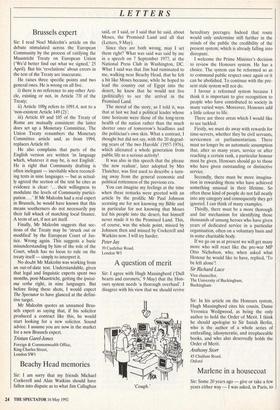A question of merit
Sir: I agree with Hugh Massingberd (Dull hearts and coronets,' 9 May) that the Hon- ours system needs 'a thorough overhaul'. I disagree with his view that we should revive 'Cough.' hereditary peerages. Indeed that route would only undermine still further in the minds of the public the credibility of the present system; which is already falling into disrepute.
I welcome the Prime Minister's decision to review the Honours system. He has a choice. The system can be reformed so as to command public respect once again or it can be abolished. To continue with the pre- sent stale system will not do.
I favour a reformed system because I think it is important to give recognition to people who have contributed to society in many varied ways. Moreover, Honours add a little colour to life.
There are three areas which I would like to see tackled.
Firstly, we must do away with rewards for time-servers, whether they be civil servants, servicemen or parliamentarians. There must no longer be an automatic assumption that, after so many years, service or after reaching a certain rank, a particular honour must be given. Honours should go to those who have given outstanding or distinctive service.
Secondly, there must be more imagina- tion in rewarding those who have achieved something unusual in their lifetime. So often these kind of people do not fall neatly into any category and consequently they get ignored. I can think of many examples.
Thirdly, there must be a more thorough and fair mechanism for identifying those thousands of unsung heroes who have given years of dedicated service in a particular organisation, often on a voluntary basis and in some charitable body.
If we go on as at present we will get many more who will react like the pre-war MP Otto Nicholson, who, when asked what Honour he would like to have, replied, 'To be left alone!
Sir Richard Luce
Vice chancellor, The University of Buckingham, Buckingham


















































 Previous page
Previous page